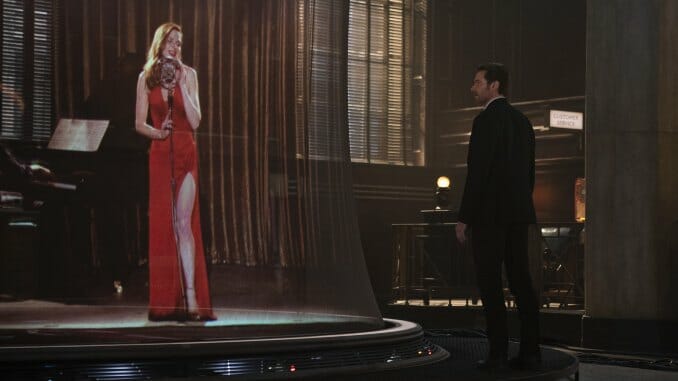Lisa Joy’s Reminiscence Slightly Misremembers a Charming Sci-Fi Noir

It was a dark and stormy night in post-apocalyptic Miami. The streets were wet, my best friend was drunk and I was just finishing up my job peddling people’s memories back to them when she walked in. A dame in a red dress. What a cliché. But we come back to clichés, like memories, for a reason. Writer/director Lisa Joy’s film debut, Reminiscence, isn’t just remembering the genre tropes of noir, but refitting them into a sci-fi world as confidently and imperfectly realized as the Westworld she co-created. It often gets stuck in its own loops, subjecting us to the same kind of forced and repeated trips down memory lane that alternatively seduce and damn its characters, but its self-serious update to the classic “gumshoe narrates a tale you know ends bad for the gumshoe” movie still has a few charms—in old ways and new.
A slick amalgamation of homages stuffed into rumpled linen, Reminiscence sticks its screw-up private eye Nick (Hugh Jackman)—who also runs a nostalgia business, literally allowing people to relive old memories, with his boozing war buddy Watts (Thandiwe Newton)—into a Chinatown-like series of run-arounds and red herrings. The big difference is that the femme that’ll quite obviously be fatale for him, Mae (Rebecca Ferguson), sings at a lounge on the flooded coast of nocturnal neo-Miami. If Westworld plays with Blade Runner’s replicants, Reminiscence plays with its wet and ruined noir. There’s a conspicuous lack of cigarette smoke, but its haze is replaced by the gauzy curtain of Nick’s Reminiscence machine, which projects its users’ memories in 3-D sepia. Mae needs it to find some lost keys, just the kind of innocuous request apt to send a down-on-his-luck dick gumshoeing for his life. Only, Nick isn’t an entranced cynic nor a truth-and-justice diehard. He’s an earnest romantic, through and through, which makes his labyrinthine journey into the mystery of Mae’s disappearance all the more tragic.
-

-

-

-

-

-

-

-

-

-

-

-

-

-

-

-

-

-

-

-

-

-

-

-

-

-

-

-

-

-

-

-

-

-

-

-

-

-

-

-








































